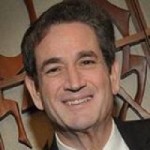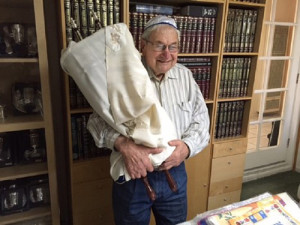By Rabbi Ben Kamin


ENCINITAS, California — There was nothing physically imposing about Lou Dunst—a cherubic, dignified man with a sweet smile yet deep sorrowful eyes. At times, when he walked slowly by, it seemed that a stiff breeze could knock him down. But then you realized that not even the wind could do such a thing; the worst genocide in the history of this planet failed to put this kind gentleman down.
It was one thing to visit in a synagogue and talk with God about life and death, fate and fortune, mortality and miracles, cruelty and compassion. It was another thing to share this conversation with a sweet elderly man who experienced all of these things and could easily debate with God on every score.
After being invited to write his impossibly miraculous life-story, I met Lou Israel Dunst, of blessed memory, in the environment he most treasured—the synagogue.
I first sat in the shul with Lou some three years ago. I was moved to consecrate life at his side, chant the blessing over the Torah scroll as he watched, and mourn the dead in the same cadenced devotion as this man who survived four Nazi death camps and became a world-renowned benefactor of human kindness.
There was nothing but tenderness in the eyes of Lou Dunst, who was born into the Nazi inferno some ninety years ago in the anti-Semitic hills and forests of pre-war Jasina, Czechoslovakia.
He had a voice as soft and a manner as considerate as the European genocide of the Jews was screeching and ruthless. Along with his beloved wife Estelle, he traveled the world with his story of both unimaginable horrors and mind-boggling survival; he inspired youngsters to do good works and he moved police officers and Navy Seals to tears and reflection. He needed to tell the story, I think, or the story would have consumed him.
Nor did the brutish murders of his parents, teachers, neighbors, and childhood friends break his spirit or stop him from walking forward—even, when by his own description, he had become a lifeless human being with no flesh at the terminus of his four death camp interments, endless box cars horror transports, and two near-misses he endured within the gas chambers.
On another Sabbath morning not long ago, in one of his three synagogues here in San Diego, Lou, in a business suit and donning a woven yarmulke [skullcap] and embroidered tallit [prayer shawl], stood up before the congregation and renewed the covenant of his Bar Mitzvah ceremony. It was on the 76th anniversary of its occurrence in secret and in fear. He sang the Hebrew, kissed the Torah scroll, and no one in the room failed to weep with bittersweet privilege.
What was furtively pulled off in the cold shadows of Jasina (and organized a few weeks early because, well, everyone knew the Nazis were coming any day) was re-celebrated on a warm sunny January day in a safe synagogue under a blue American sky.
Lou, a meditative man with an eternal spirit, likely remembered his father and mother, Mordechai and Priva—both gassed at Auschwitz. He remembered the weekly Shabbat dinners, created in spite of the hardships, the town fascist bullies, the restrictions, and the dangers.
Lou recalled the delicious aroma of the challah bread baking in the oven; he saw his mother’s rosy cheeks even while acknowledging with a humble blink of his eyes the applause and sanctifications of the congregation. While chanting the scriptural blessings, he likely remembered “the unity of the family” that he and his brother and sister irrevocably shared with their parents—until the killers came and destroyed their world in the Carpathian Mountains.
I remember: after Lou completed his recommitment, a young man came forward for a special honor: the opening up and lifting of the Torah, high on his arms, before the holy scroll was re-wrapped and replaced in the ark. For a moment, the 20th century chronicle of the Jewish people was re-enacted on the pulpit.
The younger man, brawny, informal, wearing sandals, was a hearty Israeli, a father whose little girls ran about the pulpit laughing. Holding up the Torah, he smiled at the survivor. The torch was passed. But Lou Dunst, whose love for humankind was stronger than death, was still there to do exactly what Hitler had sworn would never take place: smile upon and bless the Jewish future.
How I will miss your weekly Friday afternoon phone call, dear Lou: “Shabbat Shalom, Rabbi!” Surely the angels will pick up the phone every week now.
*
Rabbi Kamin is an author and freelance writer. You may comment to him at ben.kamin@sdjewishworld.com